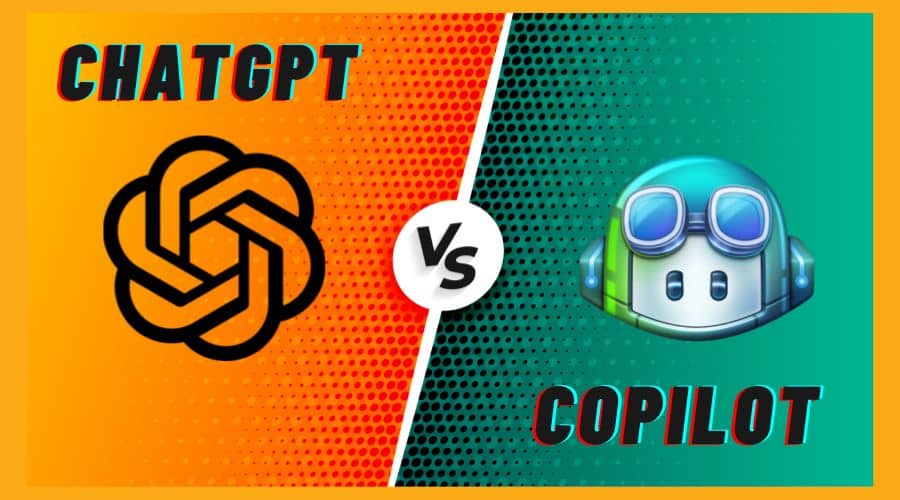Deciding between GitHub Copilot and ChatGPT? Read on to find their unique strengths and capabilities and use cases to make an informed choice in enhancing writing efficiency and code generation.
GitHub Copilot and ChatGPT are today's most influential artificial intelligence writing tools. While both enhance writing efficiency and provide code snippets, their distinct capabilities and intended purposes set them apart. This article aims to thoroughly explore their features and offer insights to help you discern between these tools effectively.
In AI-driven coding assistance, GitHub Copilot's exceptional code completion prowess reigns. Targeting developers simplifies intricate code structures effortlessly. On the other hand, ChatGPT offers a versatile, generalized AI solution, promoting adaptability and creativity within the development process.
Join us on an insightful journey as we dissect these AI giants' strengths, weaknesses, and ideal applications.
What is GitHub Copilot?
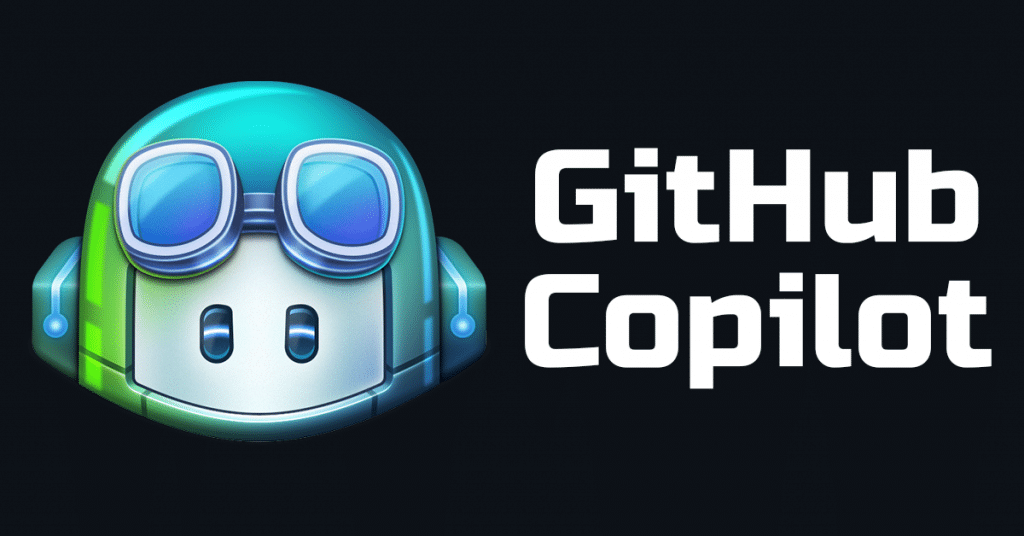
GitHub Copilot is an advanced AI-powered code completion tool developed by OpenAI in collaboration with GitHub. Leveraging the capabilities of OpenAI's GPT-3 language prediction model, Copilot integrates seamlessly into popular code editors like Visual Studio Code. It analyzes code context in real time and offers intelligent suggestions to streamline coding processes.
This tool leverages Codex, a pre-trained language model from OpenAI, using code and comments to suggest individual lines or entire functions, and it adapts to various programming languages based on the diversity and volume of training data available. Available as an extension in multiple IDEs, Copilot assists developers by offering autocomplete-style suggestions as they write code or describe desired functionalities in natural language comments, making coding more efficient and seamless.
What is ChatGPT?
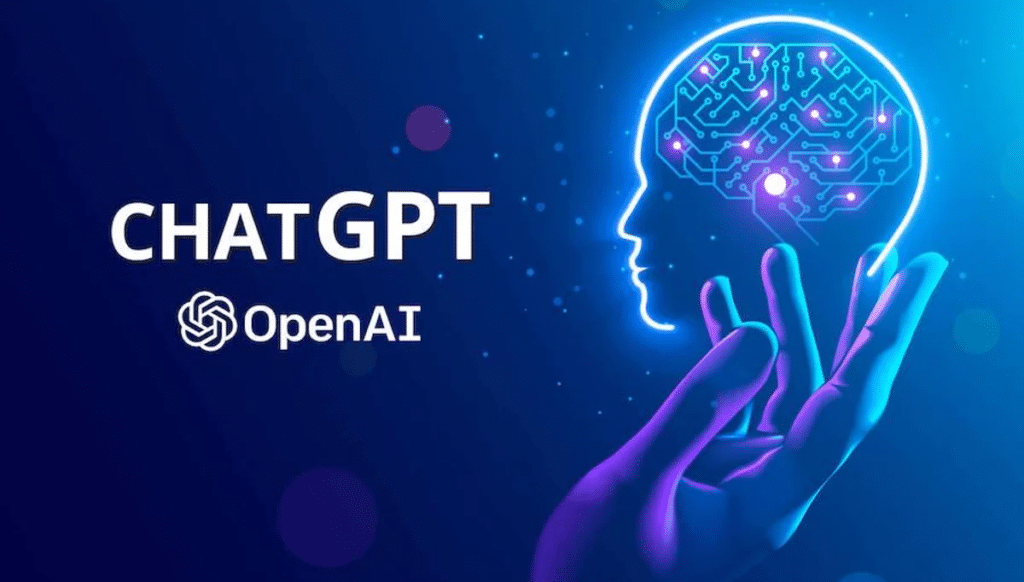
ChatGPT, developed by OpenAI, is a versatile Large Language Model (LLM) designed to generate human-like text across diverse tasks. It uses advanced language models like GPT-3.5 and GPT-4 to interpret and generate content based on provided prompts. Trained extensively on various data, ChatGPT demonstrates expertise in multiple tasks, including generating code snippets, writing articles, answering queries, and more.
Its natural language processing and machine learning capabilities enable it to understand user input, provide coherent explanations, and generate contextually relevant code snippets, catering to coding assistance and other domains.
How does Github Copilot Work?
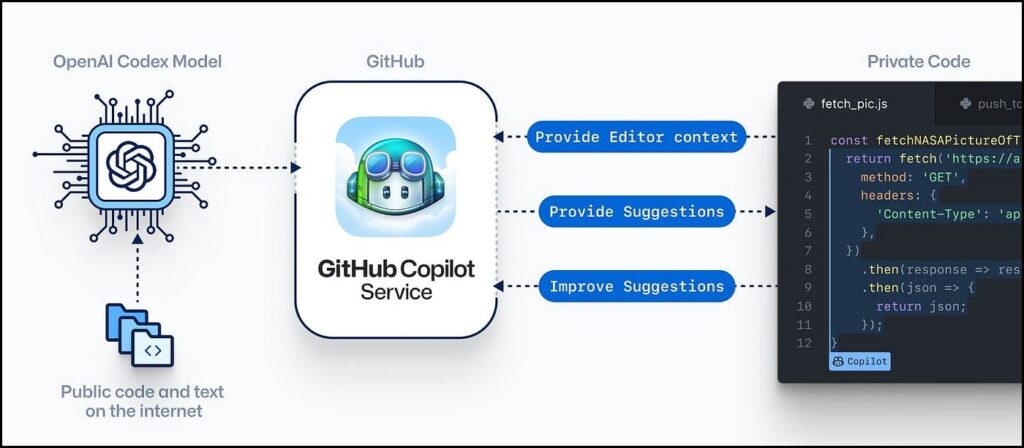
GitHub Copilot is an AI-powered coding assistant that employs machine learning to comprehend code context and offer intelligent suggestions for code completion. It excels in generating functions, variable names, and algorithms aligned with a developer's programming style, particularly beneficial at the project's inception. Continuously learning from the developer's code, Copilot refines its suggestions over time, improving its effectiveness.
It supports various programming languages, including Python, JavaScript, TypeScript, Ruby, Go, PHP, Swift, Kotlin, Rust, C#, C++, Java, HTML/CSS, and SQL, allowing its functionality to be utilized across diverse projects.
How does ChatGPT work?
ChatGPT operates as a chat-based AI model designed to simulate human-like conversations. It generates text responses based on provided prompts or questions using advanced natural language processing techniques and a transformer model trained on extensive internet data. In coding contexts, developers interact with ChatGPT by presenting queries or seeking assistance, receiving text output that includes code suggestions, explanations, or snippets tailored to their requirements.
It offers varying features and performance capabilities, available in different versions, including a free version, a premium ChatGPT Plus subscription, and an enterprise-grade option. However, while ChatGPT aids in code generation, developers should review its outputs for accuracy and alignment with coding best practices.
Github Copilot Features
GitHub Copilot stands out with several key features that transform the software development process:
- Understanding of Programming Idioms: Trained on millions of lines of code, Copilot comprehends common idioms and patterns, providing accurate and context-aware code suggestions.
- Vast Code Repository Access: It taps into GitHub's extensive codebase, offering developers relevant and well-documented examples and expediting the understanding and implementation of complex functionalities.
- Real-time Integration: Seamlessly integrates with popular code editors and IDEs like Visual Studio Code, JetBrains IDEs, and Neovim, offering real-time suggestions and ensuring a smooth coding experience.
- AI-Based Suggestions: Leveraging AI, Copilot provides intelligent, context-based code suggestions aligned with project context and coding conventions, enabling faster and more accurate coding.
- Comprehensive Code Snippets: Beyond individual lines, it offers entire functions or classes as code snippets, streamlining coding tasks and accelerating development workflows.
- Continuous Improvement: As an evolving assistant, Copilot aims to enhance its code generation capabilities through user feedback and ongoing improvements, adapting to developers' evolving needs and preferences.
ChatGPT Features
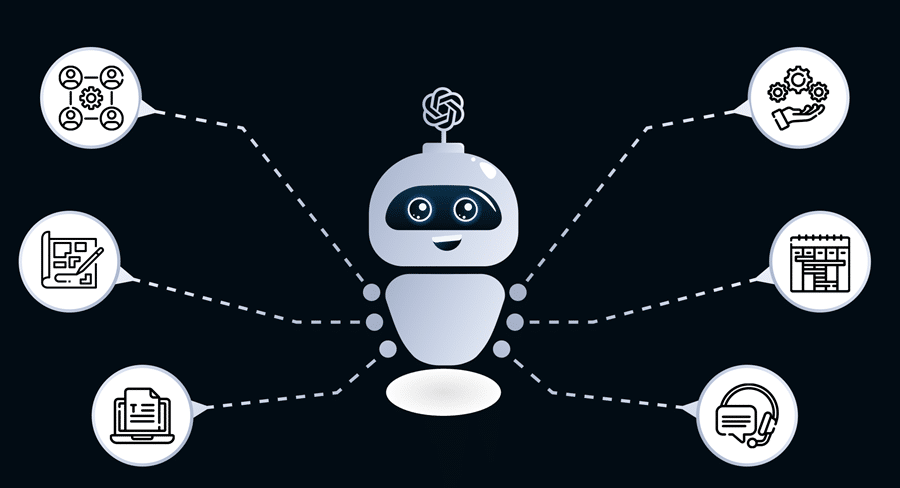
Developed by OpenAI, ChatGPT is renowned for its ability to engage in human-like conversations, tackle numerical challenges, generate diverse text, and troubleshoot code blocks. Some of its key features include:
- Conversational Abilities: It simulates human-like conversations, answering queries across various topics and addressing numerical problems, making it suitable for educational or problem-solving purposes.
- Troubleshooting Capabilities: Recognizes and rectifies errors within code blocks, aiding developers in identifying and fixing issues.
- Text Creation: Capable of generating diverse texts, including abstract messages, scholarly articles, film scripts, and more, demonstrating its flexibility beyond code generation.
- Code Generation Support: Beyond generating isolated code lines, ChatGPT provides comprehensive code snippets, including functions, classes, or modules, accelerating development workflows.
- Memory of Previous Prompts: Remembers prior interactions, offering personalized responses and, as suggested, acting akin to a customized therapist. OpenAI moderation filters inappropriate prompts.
- Versatile AI Capabilities: Powered by OpenAI's transformer-based architecture, ChatGPT excels in natural language understanding, chat interactions, language translation, answering questions, and image interpretation, catering to a wide range of developer and content creator needs.
- Seamless Integration: Easily integrated into various applications and platforms through its API, enhancing functionality and user experience by incorporating AI capabilities.
Uses of GitHub Copilot
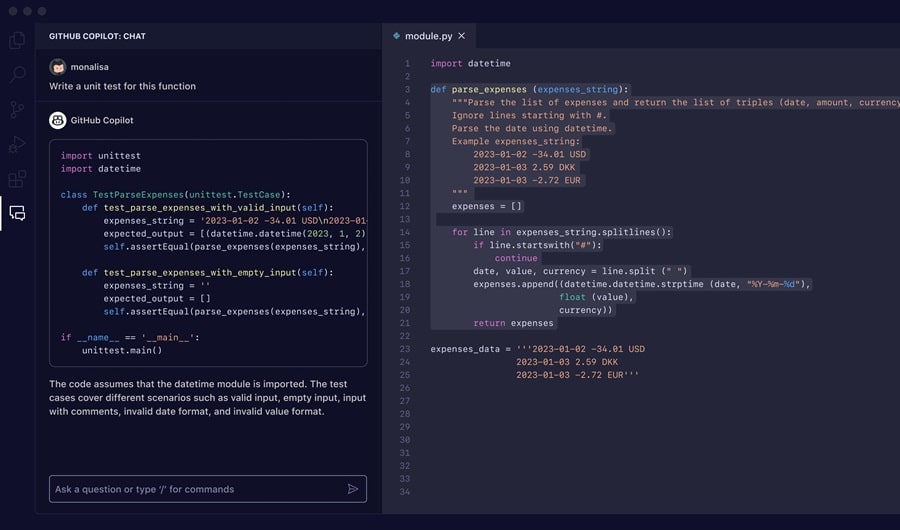
GitHub Copilot proves highly beneficial across several key areas in software development:
- Efficient Code Completion: This tool provides precise and context-aware code suggestions, accelerating coding tasks and aiding developers in exploring coding alternatives effortlessly.
- Web Application Development Support: Particularly valuable for web developers, Copilot streamlines the creation of web applications by generating boilerplate code and offering suggestions for common web development patterns, enhancing the efficiency and robustness of web-based projects.
- Handling Complex Code Structures: Copilot is a valuable resource for managing intricate logic and algorithms within projects. It swiftly generates code snippets for complex tasks, mitigating the risk of errors and saving valuable time.
Uses of ChatGPT

ChatGPT serves as a versatile ally for developers across various tasks:
- Code Generation Assistance: It aids developers by generating code snippets, functions, or even classes for multiple programming languages, automating repetitive tasks, and guiding them in implementing specific functionalities.
- Code Refactoring and Troubleshooting: It supports developers in improving code quality by providing suggestions for code refactoring, optimizations, bug fixing, and troubleshooting.
- Framework Usage and Cross-Language Migration: Assists in learning new frameworks and libraries and migrating codebases by providing examples, best practices, and even cross-language code translations, simplifying adaptation to new technologies.
- Creative Problem Solving and Exploratory Development: Encourages brainstorming, alternative solution generation, and exploratory analysis of codebases, supporting developers in tackling complex coding challenges and unfamiliar domains.
- API Integration and Rapid Prototyping: Facilitating API integration through code snippet generation accelerates the integration process and aids in rapid prototyping by swiftly providing functional code snippets based on high-level descriptions.
- General-Purpose AI Solution: Offers flexibility for various coding and non-coding tasks, aiding in experimentation, prototyping, and solution ideation.
Pros and Cons of GitHub Copilot
Pros
GitHub Copilot presents several advantages that enhance the coding experience for developers. Its features streamline coding tasks and offer efficiency gains, significantly impacting software development. Let's look at some of its pros:
- User-Friendly Interface: Copilot's interface strikes a balance, providing suggestions without overly intrusive, allowing developers to work without constant interruptions.
- Learning Aid: Copilot helps developers learn by providing well-commented code, resolving doubts, and offering insights into coding approaches.
- Problem Resolution Aid: It aids in problem-solving by generating runtime elements like divs alongside fetched data and can even assist in identifying and solving errors within the code.
- Boilerplate Code Efficiency: Copilot excels in generating reusable boilerplate code, saving developers time by allowing them to copy and paste code segments across instances within a source code.
- Fast CDN Imports: The tool's ability to quickly import libraries through simple comments streamlines the process, enhancing efficiency in integrating external libraries.
Cons
When considering the drawbacks of GitHub Copilot, it is essential to highlight areas where developers might encounter challenges or limitations while utilizing this tool. Here are some key areas to consider:
- Complexity in Suggestions: Copilot might occasionally offer code suggestions that are challenging to understand or implement immediately. This complexity could necessitate additional effort to comprehend and integrate into the existing codebase.
- Workflow Disruption: The need to review code suggestions can disrupt the smooth work flow during project development. Constant evaluation of Copilot's suggestions might intermittently interrupt the coding process.
- Security and Licensing Concerns: Questions surrounding the origin of the code, licensing agreements, and copyright attributions may arise. Addressing these concerns might present challenges, especially regarding compliance and legal aspects.
Pros and Cons of ChatGPT
Pros
When it comes to the advantages of using ChatGPT, there are several impactful aspects worth considering. Its pros include:
- Personalized Interactions: ChatGPT excels in personalized conversations, offering customers a more human-like experience, fostering stronger relationships, and enhancing brand interactions.
- Improved Customer Service: Capable of handling a large volume of customer queries, ChatGPT provides accurate responses promptly, elevating brands' customer support capabilities and enhancing service quality.
- Cost Savings: Businesses can achieve cost savings by optimizing resource utilization by minimizing the need for human customer service staff.
- Content Generation: Besides customer interactions, ChatGPT's ability to generate text-based content such as articles, stories, and summaries makes it highly versatile for content creation.
- Enhanced Productivity: Automating routine tasks allows human employees to focus on more intricate and value-added tasks. It aids in boosting overall productivity and efficiency within business operations.
Cons
It is important to note several aspects that might impact its performance and usability:
- Inconsistencies and Errors: The AI model may produce inconsistent or incorrect code suggestions due to its reliance on patterns in its training data, occasionally resulting in suboptimal outputs.
- Limited Programming Language Knowledge: ChatGPT's understanding of programming languages is confined to the data it was trained on, potentially resulting in outdated or less optimized code suggestions, especially concerning newer or specialized language features and frameworks.
- Lack of Domain-Specific Knowledge: ChatGPT might lack specialized or industry-specific knowledge necessary for specific coding tasks, as its training encompasses a wide range of sources but might not cover domain-specific expertise.
Similarities Between GitHub Copilot and ChatGPT
GitHub Copilot and ChatGPT, developed by OpenAI, harness advanced AI technologies driven by neural networks. Let us look at some of the similarities between the two giants:
- AI Technology: Both rely on advanced AI technologies developed by OpenAI, utilizing neural networks for text analysis and generation.
- Training Data: They have been trained on vast amounts of language data to enhance accuracy and effectiveness in their respective tasks.
- Assistance in Language Tasks: Both tools aim to assist users with language-related tasks. GitHub Copilot focuses on code generation/completion, while ChatGPT is an all-purpose language model handling various tasks.
- Shared Capabilities: They share similar capabilities enabled by OpenAI's GPT LLMs, generating results in distinct but powerful ways.
- Integration and Expansion: Both are integrated into various applications and platforms. For instance, Microsoft employs Copilot in Office applications and integrates ChatGPT into Bing search engine capabilities.
- Future of AI-Assisted Work: They represent the evolving landscape of AI-powered assistants poised to improve efficiency and productivity across multiple domains.
- Developer Productivity: Both have demonstrated the potential to boost developer productivity by automating routine tasks, indicating future integration into development tools for streamlined workflows.
Differences Between GitHub Copilot and ChatGPT
GitHub Copilot is specifically tailored for code generation and completion, whereas ChatGPT is a versatile language model adaptable to various language-related tasks. Here are the key distinctions between the two:
- Task Focus: Copilot specializes in code completion and snippet generation, while ChatGPT functions as a general-purpose language model, assisting in a broader range of tasks beyond programming.
- Industry Focus: Copilot is tailored for the software development industry, emphasizing error-free code generation and insights to enhance code quality. ChatGPT's capabilities span text-based outputs, including code generation and debugging in various scripts.
- Integration and Output: Copilot is tightly integrated into Visual Studio Code and specializes in generating code snippets. ChatGPT generates natural language responses and can be used for various language-related tasks.
- Functionality Priority: Copilot prioritizes code generation and completion, while ChatGPT leans towards human-like responses, long-form articles, and diverse language-related tasks.
- Scope of Assistance: Copilot suggests specific function implementations and simplifies code structures. ChatGPT helps design complex systems, offering guidance for programming language syntax creation, grammar building, and compiler implementation steps.
- Pricing Model: Copilot is a paid service linked to GitHub's subscription plans, whereas ChatGPT is accessible for free via OpenAI's API.
Which is Better in Coding?
Choosing between GitHub Copilot and ChatGPT depends on the specific needs and preferences of the user. GitHub Copilot excels in code generation and completion, making it ideal for developers seeking assistance in coding tasks. On the other hand, ChatGPT offers versatility for diverse language-related tasks beyond coding. The better choice for coding depends on whether precise code assistance or a broader language model for various tasks is required.
Conclusion
Choosing between GitHub Copilot and ChatGPT relies on evaluating specific needs and project dynamics. Assess programming preferences and project complexity, and experiment with both tools to make an informed decision. While beneficial, these tools have limitations, requiring validation for critical tasks. The combined effort between human intelligence and AI enhances productivity. GitHub Copilot excels in faster code generation, while ChatGPT's versatility extends beyond coding, catering to diverse scenarios. Aligning the tool's strengths with specific needs optimizes efficiency across development tasks.
